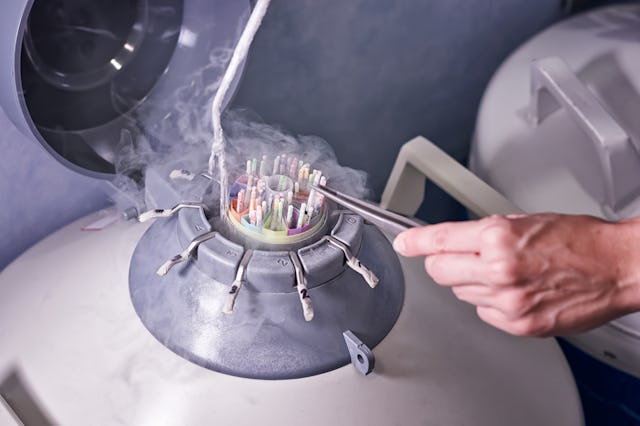An Expert Guide On How To Find A Good Sperm Donor
If the recent Netflix documentary Our Father haunts you, here’s everything you need to know to avoid a similarly unthinkable sperm donation nightmare.

There are many unique ways to have a family, and conceiving a baby via a sperm donor is a great choice for many families, including same-sex parents, single women, and couples experiencing fertility issues. "It's important to remember that, when using donor sperm, though it might feel like an overwhelming decision, you are just accepting a single cell to help grow your family," Dr. Iris Insogna of Columbia University Fertility Center tells Scary Mommy. "Using donor sperm is a wonderful way to help build a family." Even so, figuring out how to find a sperm donor — once you've settled on sperm donation as the method of conception — can feel daunting.
While most of the time, finding a sperm donor can be a typically seamless process, some safety concerns have surfaced with the recent Netflix documentary Our Father, in which a fertility specialist inseminated dozens of patients with his own sperm without their knowledge or consent. So, in addition to the criteria you decide upon for your sperm donor — tall? brunette? brown eyes? — you also want to consider precautions to take so that you not only settle on the right donor for you but also feel safe and protected in doing so.
Below, experts provide insight on how to best safeguard yourself and your baby's rights when finding a sperm donor.
How to Find a Sperm Donor
Usually, aspiring parents begin their search for a sperm donor at a fertility center. Specialists there will guide you in choosing the right cryobank (where frozen sperm is held) for your needs. "I generally recommend using anonymous donor sperm that can be purchased from a reputable bank," Insogna says. "Though there are sometimes compelling reasons to consider a known sperm donor, it generally requires more time for screening and quarantining of the sperm. Frozen anonymous donor sperm can be purchased and is ready to use right away."
If, for some reason, you choose to go with a known sperm donor, fertility lawyer Amira Hasenbush, JD, MPH, tells Scary Mommy it's imperative to have a legal contract drawn up between the known sperm donor and the intended parent(s).
"This makes it clear that the donor is not a legal parent and the parent(s) are," she says. "It can outline things like what disclosure and contact there will be, whether sperm can be frozen and used indefinitely in the future and other agreements between the parties. It is legally required in most states when using sperm that is not purchased from a sperm bank, so it's pretty common. In many states, without it, the donor could be found to be a legal parent."
When in doubt, consult a lawyer about your fertility rights.
Establish Which Traits You're Seeking in a Donor
Once you've settled on the cryobank of your choice, now it's time to find a suitable donor. Cryobank websites are similar to dating websites (without the swipe left option), allowing you to scroll through donors based on a list of various characteristics to hone in on the specific traits that might make a donor feel like a good fit.
"Some people prioritize physical attributes (hair/eye/skin color, height, build) while others might prioritize a donor's interests, hobbies, or educational background," Insogna explains. "Some people look for a donor who is athletic or artistic, etc. There are lots of different types of traits that you can search for — and the ones that matter most to you are the ones you should prioritize."
Insogna says you will want to make sure that the donor has been screened for infectious diseases. She also suggests comparing your genetic screening to the donor "to make sure there is no overlap in genetic conditions between you and the donor."
Through the cryobank, you will have access to information about the family history of the donor, says Insogna, and can review that as well. She recommends also checking your own Cytomegalovirus (CMV) status before choosing a donor. CMV is a common virus related to the herpes virus that is spread through sexual contact and other bodily fluids. It's said that over half of Americans have CMV in their body by the age of 40. Because CMV is considered the only member of the herpes virus spread directly from mother to child through the placenta, Insogna says, "If you are CMV negative, it is generally recommended to pick a donor who is also CMV negative. If you are CMV positive, you can pick a donor who is CMV positive or negative." You can usually book a testing with your medical doctor.
Communicate Throughout the Process
Dr. Insogna suggests that while choosing a sperm donor is a crucial part of your parenting journey, it's also a good idea to think of the big picture — especially when your child is older.
"There is good evidence that, when they are old enough to understand, children conceived through donor sperm should be told, so it does not feel like a secret that has been kept from them. Though anonymous donors may be open to being contacted when the child is old enough, they will likely never be a part of your child's life. However, with genetic testing becoming more available, it may become easier for donors and children conceived using donors to identify one another. Anonymity cannot be entirely guaranteed."
Which is why she strongly recommends consulting with a fertility specialist for these conversations: "We can help discuss these complex considerations, as well as help guide your donor choice and treatment plan."
Expert Sources:
Dr. Iris Insogna of Columbia University Fertility Center
Fertility lawyer Amira Hasenbush, JD, MPH